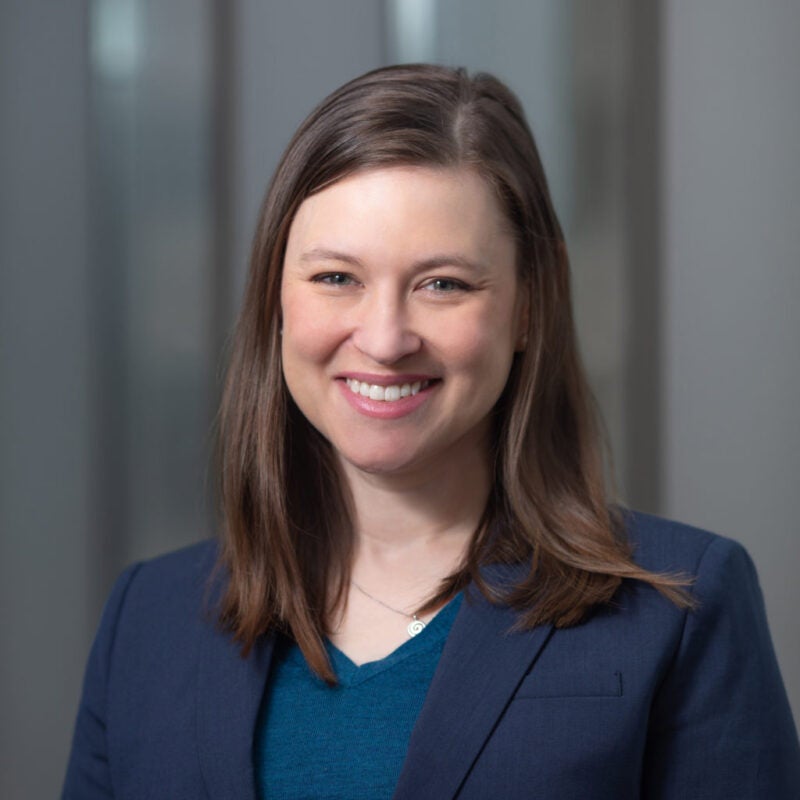Ruth Greenwood, a visiting assistant clinical professor of law and the director of the Election Law Clinic at Harvard Law School, was appointed an assistant clinical professor of law at Harvard Law School, effective Jan. 1.
Greenwood joined the Harvard Law faculty in January 2020 as a lecturer on law and launched the Voting Rights Litigation and Advocacy Clinic. While many of the top law schools offer courses in election law, Harvard, under Greenwood’s direction, was the first law school in the country with an in-house clinic designed entirely around a practice in election law.
“Ruth Greenwood is a terrific lawyer and clinical teacher who has guided the Election Law clinic and its students in ground-breaking and influential work in support of democracy and voting rights,” said John F. Manning ’85, the Morgan and Helen Chu Dean of Harvard Law School. “I am delighted to welcome her to the full-time faculty of the Law School.”
“I am absolutely thrilled to keep working to protect voting rights across the country while training a new generation of election lawyers,” said Greenwood. “The clinic is able to help marginalized communities build power because of the incredible experience, talent, and hard work that students bring to the clinic. I am excited to see how our growing alumni network will shape the practice of election law for years to come.”
A prominent and highly experienced attorney and voting rights advocate, Greenwood engages in litigation and advocacy on a variety of election law cases.
She litigated two partisan gerrymandering cases from the trial level to the U.S. Supreme Court: Gill v. Whitford and Rucho v. Common Cause. She has also litigated minority vote dilution claims under state and federal voting rights acts, racial gerrymandering claims, and cases alleging a burden on the fundamental right to vote. In Jacksonville Branch of the NAACP v. City of Jacksonville, the clinic successfully argued against the use of racially biased redistricting maps in the 2023 and 2024 city council and school board elections. In January 2023, the 11th Circuit Court of Appeals held that an interim map that addressed the most egregious problems of the original gerrymandered map would be in place during the election for city council in March 2023.
In addition, she has advised dozens of state advocates on drafting and implementing independent redistricting commissions, state voting rights acts, and adopting ranked choice voting.
“Ruth Greenwood has developed an extraordinary docket in the Election Law clinic, working on impactful cases and complex issues while ensuring students and clinical pedagogy are front and center. I am thrilled that she is a member of the HLS clinical community,” said Chris Bavitz, the WilmerHale Clinical Professor of Law and vice dean for Experiential and Clinical Education at Harvard Law School.
Her article “Voting Under State Law,” co-authored with Sarah A. Sadlier, is forthcoming in the Oxford Handbook of American Election Law. She co-authored an article on the rise of state voting rights acts, “Voting Rights Federalism,” with Harvard Law Professor Nicolas Stephanopoulos, published in the Emory Law Journal (May 2023).
Prior to joining Harvard Law School, Greenwood served as the co-director of Voting Rights and Redistricting at the nonpartisan Campaign Legal Center, where she developed and implemented redistricting program plans and engaged in litigation on a variety of redistricting issues. Her focus was on ending partisan gerrymandering and promoting minority representation.
A native of Australia, Greenwood received a Bachelor of Science degree and an LL.B. from the University of Sydney, Australia, in 2003 and 2005 respectively. In 2009, she received an LL.M. from Columbia Law School, and is admitted to practice as an attorney in Massachusetts, Illinois, and New York.
Harvard has the most wide-ranging clinical program of any law school in the U.S., with 38 clinics and 11 student practice organizations that enable students to provide free legal services to people in need under the supervision of clinical professors and instructors. In recent years, the law school has established new clinics in a wide range of legal areas, including the Animal Law & Policy Clinic, the Election Law Clinic, the LGBTQ+ Advocacy Clinic, the Institute to End Mass Incarceration Clinic, and the Religious Freedom Clinic.
Want to stay up to date with Harvard Law Today? Sign up for our weekly newsletter.
